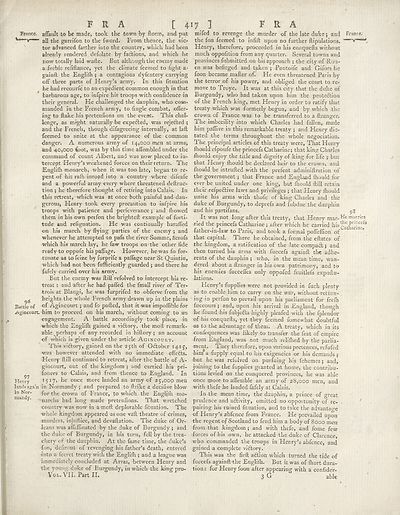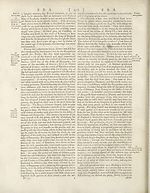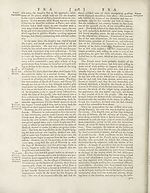Encyclopaedia Britannica > Volume 7, ETM-GOA
(457) Page 417
Download files
Complete book:
Individual page:
Thumbnail gallery: Grid view | List view

FRA [4
France, aflault to be made, took the town by ftorm, and put
'" * 11 all the garrifon to the fword. From thence, the vic»
tor advanced farther into the country, which had been
already 1 endered defolate by factions, and which he
now totally laid walte. But although the enemy made
.a feeble reliftance, yet the climate feemed to fight a-
gainft the Englifh ; a contagious dyfcntery carrying
off three parts of Henry’s army. In this fituation
he had recourfe to an expedient common enough in that
barbarous age, to infpire his troops with confidence in
their general. He challenged the dauphin, who com¬
manded in the French army, to fingle combat, offer¬
ing to flake his pretenfions on the event. This chal¬
lenge, as might naturally be expe&ed, was rejected ;
and the French, though difagreeing internally, at laft
feemed to unite at the appearance of the common
danger. A numerous army of 14,000 men at armsj
and 40,000 4bot, was by this time affembled under the
command of count Albert, and was now placed to in¬
tercept Henry’s weakened forces on their return. The
Englilh monarch, when it was too late, began to re¬
pent of his rath inroad into a country where difeafe
and a powerful army every where threatened deftruc-
tion ; he therefore thought of retiring into Calais. In
this retreat, which was at once both painful and dan¬
gerous, Henry took every precaution to infpire his
troops with patience and perfeverance; and fhowcd
them in his own perfon the brighteft example of forti¬
tude and refignation. He was continually haraffed
on his march by flying parties of the enemy ; and
whenever he attempted to pafs the river Somme, Scrofs
which his march lay, he faw troops on the other fide
ready to oppofe his paflage. However, he was fo for¬
tunate as to feize by furprife a paffage near St Quintin,
which had not been fufficiently guarded ; and there he
fafely carried over his army.
But the enemy was ftill refolved to intercept his re¬
treat : and after he had paffed the fmall river of Ter-
trois at Blangi, he was furprifed to obferve from the
6 heights the whole French army drawn up in the plains
Battle of of Agincourt; and fo polled, that it was impoffible for
aigincoiut. him to proceed on his march, without coming to an
engagement. A battle accordingly took place, in
which the Englilh gained a vi&ory, the moil remark¬
able perhaps of any recorded in hiftory; an account
of which is given under the article Agincourt.
This vi&ory, gained on the 25th of O&obcr 141J,
was however attended with no immediate effedffs.
Henry ftill continued to retreat, after the battle of A-
gincourt, out of the kingdom ; and carried his pri-
fone-rs to Calais, and from thence to England. In
Henry be once more landed an army of 25,000 men
lands again in Normandy ; and prepared to ftrike a decifive blow
in Nor- for the crown of France, to which the Englifh mo*-
niaE ' narchs had long made pretenfions. That wretched
country was now in a moft deplorable fituation. The
whole kingdom appeared as one vaft theatre of crimes,
murders, injurtice, and devaftation. The duke of Or¬
leans was affaffinated by the duke of Burgundy ; and
the duke of Burgundy, in his turn, fell by the trea¬
chery of the dauphin. At the fame time, the duke’s
fon, defirous of revenging his father’s death, entered
into a fecret treaty with the Englilh ; and a league was
immediately concluded at Arras, between Henry and
the young duke of Burgundy, in which the king pro-
Vol. VII. Part II.
17 ] FRA
mifed to revenge the murder of the late duke j and France,
the fon feemed to inlift upon no further ftipulations. —
Henry, therefore, proceeded in his conquefts without
much oppofition from any quarter. Several towns and
provinces fubmitted on his approach ; the city of Rou¬
en was befieged and taken ; Pontoife and Gifors he
foon became mafter of. He even threatened Paris by
the terror of his power, and obliged the court to re¬
move to Troye. It was at this city that the duke of
Burgundy, who had taken upon him the protedtion
of the French king, met Henry in order to ratify that
treaty which was formerly begun, and by which the
crown of France was to be transferred to a ftranger.
The imbecility into which Charles had fallen, made
him paflive in this remarkable treaty ; and Henry dic¬
tated the terms throughout the whole negociation.
The principal articles of this treaty were. That Henry
lhauld efpoufe the princefs Catharine; that king Charles
Ihould enjoy the title and dignity of king -for life ; bui;
that Henry Ihould be declared heir to the crown, and
Ihould be intrufted with the prefent adminiftration of
the government; that France and England Ihould for
ever be united under one king, but fliould ftill retain
their refpe&ive laws and privileges ; that Henry Ihould
unite his arms with thofe of -king Charles and the
duke of Burgundy, to deprefs and fubdue the dauphin
and his piartifans. 9S
_ It was not long after this treaty, that Henry mar-Kc marries
ried the princefs Catharine ; after which he carried his *
father-in-law to Paris,' and took a formal poffeffion of
that capital. There he obtained, from the eftates of
the kingdom, a ratification of the late compact; and
then turned his arms with fuccefs againft the adhe¬
rents of the dauphin ; who, in the mean time, wan¬
dered about a ftranger in his own patrimony, and to
his enemies fucceffes only oppofed fruitlefs expoftu-
lations.
Henry’s fupplies were not provided in fuch plenty
as to enable him to carry on the war, without return-,
ing in perfon to prevail upon his parliament for frefh
fuccours; and, upon his arrival in England, though
he found his fubje&s highly pleafed with the fplendor
of his conquefts, yet they feemed fomewhat doubtful
as to the advantage of them. A treaty, which in its
confequences was likely to transfer the feat of empire
-from England, was not much reli/hed by the parlia¬
ment. They therefore, upon various pretences, refufed
him a fupply equal to his exigencies or his demands ;
but he was refolved on purfuing his fchemes; and,
joining to the fupplies granted at home, the contribu¬
tions levied on the conquered provinces, he was able
once more to affemble an army of 28,000 men, and
with thefe he landedlafely at Calais.
In the mean time, the dauphin, a prince of great
prudence and aftivity, omitted no oppoitunity of re¬
pairing his ruined fituation, and to take the advantage
of Henry’s abfence from France. He prevailed upon
the regent of Scotland to fend him a body of 8000 men
from that kingdom ; and with thefe, and fome few
forces of his own, he attacked the duke of Clarence,
who commanded the troops in Henry’s abfence, and
gained a complete viftory.
This was the firft action which turned the tide of
fuccefs againft the Englilh. But it was of ftiort dura¬
tion: for Henry foon after appearing with a confider-
3 G able
France, aflault to be made, took the town by ftorm, and put
'" * 11 all the garrifon to the fword. From thence, the vic»
tor advanced farther into the country, which had been
already 1 endered defolate by factions, and which he
now totally laid walte. But although the enemy made
.a feeble reliftance, yet the climate feemed to fight a-
gainft the Englifh ; a contagious dyfcntery carrying
off three parts of Henry’s army. In this fituation
he had recourfe to an expedient common enough in that
barbarous age, to infpire his troops with confidence in
their general. He challenged the dauphin, who com¬
manded in the French army, to fingle combat, offer¬
ing to flake his pretenfions on the event. This chal¬
lenge, as might naturally be expe&ed, was rejected ;
and the French, though difagreeing internally, at laft
feemed to unite at the appearance of the common
danger. A numerous army of 14,000 men at armsj
and 40,000 4bot, was by this time affembled under the
command of count Albert, and was now placed to in¬
tercept Henry’s weakened forces on their return. The
Englilh monarch, when it was too late, began to re¬
pent of his rath inroad into a country where difeafe
and a powerful army every where threatened deftruc-
tion ; he therefore thought of retiring into Calais. In
this retreat, which was at once both painful and dan¬
gerous, Henry took every precaution to infpire his
troops with patience and perfeverance; and fhowcd
them in his own perfon the brighteft example of forti¬
tude and refignation. He was continually haraffed
on his march by flying parties of the enemy ; and
whenever he attempted to pafs the river Somme, Scrofs
which his march lay, he faw troops on the other fide
ready to oppofe his paflage. However, he was fo for¬
tunate as to feize by furprife a paffage near St Quintin,
which had not been fufficiently guarded ; and there he
fafely carried over his army.
But the enemy was ftill refolved to intercept his re¬
treat : and after he had paffed the fmall river of Ter-
trois at Blangi, he was furprifed to obferve from the
6 heights the whole French army drawn up in the plains
Battle of of Agincourt; and fo polled, that it was impoffible for
aigincoiut. him to proceed on his march, without coming to an
engagement. A battle accordingly took place, in
which the Englilh gained a vi&ory, the moil remark¬
able perhaps of any recorded in hiftory; an account
of which is given under the article Agincourt.
This vi&ory, gained on the 25th of O&obcr 141J,
was however attended with no immediate effedffs.
Henry ftill continued to retreat, after the battle of A-
gincourt, out of the kingdom ; and carried his pri-
fone-rs to Calais, and from thence to England. In
Henry be once more landed an army of 25,000 men
lands again in Normandy ; and prepared to ftrike a decifive blow
in Nor- for the crown of France, to which the Englifh mo*-
niaE ' narchs had long made pretenfions. That wretched
country was now in a moft deplorable fituation. The
whole kingdom appeared as one vaft theatre of crimes,
murders, injurtice, and devaftation. The duke of Or¬
leans was affaffinated by the duke of Burgundy ; and
the duke of Burgundy, in his turn, fell by the trea¬
chery of the dauphin. At the fame time, the duke’s
fon, defirous of revenging his father’s death, entered
into a fecret treaty with the Englilh ; and a league was
immediately concluded at Arras, between Henry and
the young duke of Burgundy, in which the king pro-
Vol. VII. Part II.
17 ] FRA
mifed to revenge the murder of the late duke j and France,
the fon feemed to inlift upon no further ftipulations. —
Henry, therefore, proceeded in his conquefts without
much oppofition from any quarter. Several towns and
provinces fubmitted on his approach ; the city of Rou¬
en was befieged and taken ; Pontoife and Gifors he
foon became mafter of. He even threatened Paris by
the terror of his power, and obliged the court to re¬
move to Troye. It was at this city that the duke of
Burgundy, who had taken upon him the protedtion
of the French king, met Henry in order to ratify that
treaty which was formerly begun, and by which the
crown of France was to be transferred to a ftranger.
The imbecility into which Charles had fallen, made
him paflive in this remarkable treaty ; and Henry dic¬
tated the terms throughout the whole negociation.
The principal articles of this treaty were. That Henry
lhauld efpoufe the princefs Catharine; that king Charles
Ihould enjoy the title and dignity of king -for life ; bui;
that Henry Ihould be declared heir to the crown, and
Ihould be intrufted with the prefent adminiftration of
the government; that France and England Ihould for
ever be united under one king, but fliould ftill retain
their refpe&ive laws and privileges ; that Henry Ihould
unite his arms with thofe of -king Charles and the
duke of Burgundy, to deprefs and fubdue the dauphin
and his piartifans. 9S
_ It was not long after this treaty, that Henry mar-Kc marries
ried the princefs Catharine ; after which he carried his *
father-in-law to Paris,' and took a formal poffeffion of
that capital. There he obtained, from the eftates of
the kingdom, a ratification of the late compact; and
then turned his arms with fuccefs againft the adhe¬
rents of the dauphin ; who, in the mean time, wan¬
dered about a ftranger in his own patrimony, and to
his enemies fucceffes only oppofed fruitlefs expoftu-
lations.
Henry’s fupplies were not provided in fuch plenty
as to enable him to carry on the war, without return-,
ing in perfon to prevail upon his parliament for frefh
fuccours; and, upon his arrival in England, though
he found his fubje&s highly pleafed with the fplendor
of his conquefts, yet they feemed fomewhat doubtful
as to the advantage of them. A treaty, which in its
confequences was likely to transfer the feat of empire
-from England, was not much reli/hed by the parlia¬
ment. They therefore, upon various pretences, refufed
him a fupply equal to his exigencies or his demands ;
but he was refolved on purfuing his fchemes; and,
joining to the fupplies granted at home, the contribu¬
tions levied on the conquered provinces, he was able
once more to affemble an army of 28,000 men, and
with thefe he landedlafely at Calais.
In the mean time, the dauphin, a prince of great
prudence and aftivity, omitted no oppoitunity of re¬
pairing his ruined fituation, and to take the advantage
of Henry’s abfence from France. He prevailed upon
the regent of Scotland to fend him a body of 8000 men
from that kingdom ; and with thefe, and fome few
forces of his own, he attacked the duke of Clarence,
who commanded the troops in Henry’s abfence, and
gained a complete viftory.
This was the firft action which turned the tide of
fuccefs againft the Englilh. But it was of ftiort dura¬
tion: for Henry foon after appearing with a confider-
3 G able
Set display mode to:
![]() Universal Viewer |
Universal Viewer | ![]() Mirador |
Large image | Transcription
Mirador |
Large image | Transcription
Images and transcriptions on this page, including medium image downloads, may be used under the Creative Commons Attribution 4.0 International Licence unless otherwise stated. ![]()
| Encyclopaedia Britannica > Encyclopaedia Britannica > Volume 7, ETM-GOA > (457) Page 417 |
|---|
| Permanent URL | https://digital.nls.uk/189127170 |
|---|
| Attribution and copyright: |
|
|---|
| Description | Ten editions of 'Encyclopaedia Britannica', issued from 1768-1903, in 231 volumes. Originally issued in 100 weekly parts (3 volumes) between 1768 and 1771 by publishers: Colin Macfarquhar and Andrew Bell (Edinburgh); editor: William Smellie: engraver: Andrew Bell. Expanded editions in the 19th century featured more volumes and contributions from leading experts in their fields. Managed and published in Edinburgh up to the 9th edition (25 volumes, from 1875-1889); the 10th edition (1902-1903) re-issued the 9th edition, with 11 supplementary volumes. |
|---|---|
| Additional NLS resources: |
|

